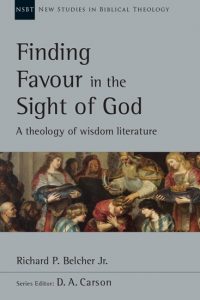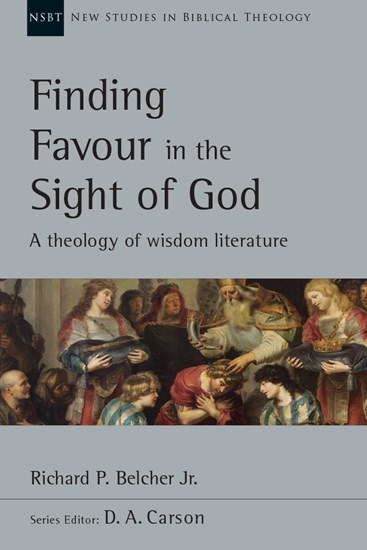Belcher, Richard P, Jr. Finding Favour in the Sight of God: A Theology of Wisdom Literature. NSBT 46. Downers Grove, IL: IVP Academic, 2018. Paperback. $26.00. 272 pp.
Richard Belcher is Professor of Old Testament and Academic Dean at Reformed Theological Seminary in Charlotte, NC. He has written commentaries on Job and Ecclesiastes, as well as several works exploring the Messiah across the biblical literature. This monograph is a recent addition to the New Studies in Biblical Theology series published by InterVarsity Press. The series has over fifty volumes in print, including a few others addressing wisdom.
The monograph begins with a brief exploration of the problem of wisdom literature in the modern discussion. Belcher deftly summarizes the place wisdom has had within biblical theology, including the most recent debates about the wisdom tradition in ancient Israel undertaken by Kynes, Sneed, and Longman. After the introductory discussion, each of the main wisdom texts is explored, with each afforded three chapters—Proverbs (57 pgs), Job (58 pgs), and Ecclesiastes (55 pgs). The monograph concludes with a chapter on the relationship between Jesus and wisdom (23 pgs). While the nature of wisdom in the Song of Songs continues to be contentious (see pg. 10n47), the long Jewish and Christian tradition of reading the book as intimating the love between YHWH/Christ and his people should have warranted some extended treatment, if only to honor the Solomonic association in the canonical text. This would have also fit within the monograph’s broader theme of finding favor in the sight of God. In that same vein, noticeably absent is the treatment of wisdom literature within the history of interpretation. None of the main figures in Jewish or Christian history are noted for their significant roles in understanding these books as part of our shared tradition, or even in the contentious debates concerning the association between Christ and wisdom. Surveying the indices, I did not observe any names prior to the mid-nineteenth century.
This absence was especially felt in the treatment of Ecclesiastes. Almost the entire tradition has interpreted Qoheleth’s words as a positive contribution to the canon (see Christianson’s Ecclesiastes Through the Centuries [Wiley, 2007]). Belcher follows a recent trend of distinguishing two voices in the text: the frame editor/voice and the voice of Qoheleth. In his view, the former offers biting criticism of the latter. While I agree that hearing two voices is an improvement over past interpretations, the exegetical basis for a negative assessment of Qoheleth’s words is (in my opinion) shaky. Given the ambiguity of the text at several critical junctures, one could hear the two voices congruently. Since one’s interpretive decisions here are so important for the overall message of the text, some engagement with the history of interpretation would have been helpful to allow readers a more informed understanding of what is at stake for a theology of wisdom. That said, I came away from the Ecclesiastes chapters far richer having read them, with a greater appreciation for the structural unity of the book and for a negative assessment of Qoheleth’s words.
Notwithstanding these criticisms, I want to emphasize how helpful this volume has been. Nearly every page of my copy has highlights and scribbled notes, and I anticipate returning to it often as part of my wisdom reference material. Concerning his underlying approach, I appreciated Belcher’s stance against the typical historical-critical view of wisdom along non-religious or secular terms. He situates wisdom in ancient Israel within the fear of Yhwh, allowing the wisdom books to have a more grounded place in their canonical context. More, the association of wisdom with Solomon is not envisioned as a pious fiction; he is seen to have a real, historical role to play in the wisdom traditions of ancient Israel. The reader will feel like they are being led on a tour of discovery into the text and its canonical associations, rather than around them. This is one of the great strengths of the monograph. The chapters on Proverbs are an excellent introduction to wisdom generally, and Belcher skillfully assessed the hermeneutical challenges of this book. I was most impressed, however, with his chapters on Job. I felt like I was learning something new on every page, and he even changed my mind on a few interpretive positions I previously held. Chapter six—on the debate in Job 4–26 about retribution, suffering, and God’s justice—is the highlight of the monograph for me.
In conclusion, I would heartily recommend this book for scholars and biblical-theological students alike. Students picking this up should know that Belcher has “done his homework.” He is a well-seasoned scholar and has provided a rigorously academic and theologically rich discussion—two things you do not always find together. For my faculty colleagues, I was also assessing this book for future use in undergraduate biblical studies. It might be a good addition in that context for an upper-level seminar course, but outside of that it is more appropriate for masters and doctoral students. A course on wisdom literature would be well-served by pairing this with Longman’s Fear of the Lord is Wisdom (Baker, 2017). In sum, I found this monograph to be a welcome addition to available resources on the wisdom literature and am grateful for the author’s contribution.
Andrew C. Witt
Tyndale University, Toronto





